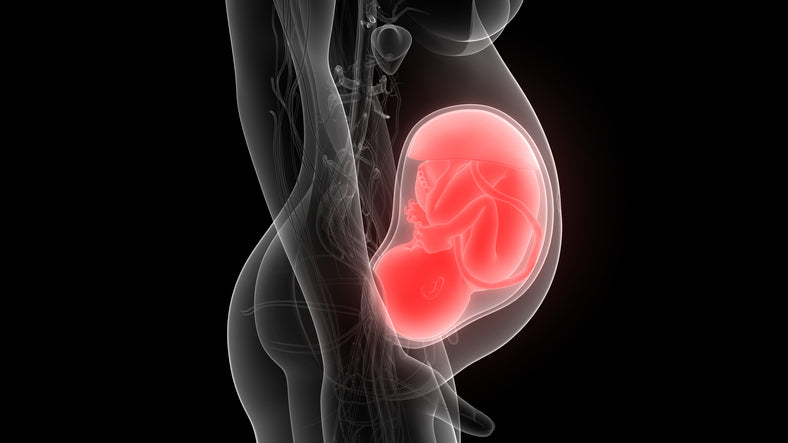The 40 Weeks of Pregnancy: Week by Week

It starts with two pink lines, a plus sign, or a digital test reading “pregnant.” The emotions then begin to rollercoaster their way into your life: Excitement, Fear, Anxiety, Doubt, Panic, Joy.
After reality sets in, remind yourself that you only have 40 weeks with this little being inside of you. (More like 41-42 weeks on average, but who’s really counting?)
It’s time to figure out what will change, how life will be different, and what you can do to help and prepare for this baby.

Pregnancy: Week by Week
Weeks 1-2
As you noticed, the first two weeks are freebies that they throw in because the doctor bases your due date 40 weeks from your last menstrual cycle. If you know your exact date of ovulation, you can calculate your due date by counting 38 weeks from there. However, the average pregnancy is 41 weeks and 1 day in length and is still normal at 42 weeks. So instead of nit-picking at a certain day on the calendar, give yourself a “due month,” a 4-week window (weeks 38-42) of when baby can make her appearance. This will take a lot of weight from your shoulders, and keep people from nagging you to death once you hit 39 weeks.
Weeks 3-4
Even weeks 3-4 of pregnancy go overlooked to most women, as their period has not been missed yet. However, if you were charting your temperature, taking ovulation tests, or hoarding dollar store pregnancy tests (like me), then you may have found out the wonderful news as early as 3 weeks along. There typically are not many true symptoms at this point, as the hormones are still building and aren’t strong enough to knock you down yet.
Week 5
Month two begins at week 5. It’s a bit early to shout your pregnancy from the rooftops unless you just can’t wait – then shout away! Many women wait until they have heard a heartbeat or enter the second trimester to share, but there are no rules to pregnancy announcements. Your little embryo is rapidly forming, looking quite like a tadpole. Your hCG hormone (human chorionic gonadotrophin) is rising at a significant rate, this hormone is produced by the cells forming the placenta, and they cause all of your early symptoms.
Weeks 6-12
Between weeks 6-12, you may (or may not) experience a plethora of symptoms. Morning sickness is the most well-known symptom, but don’t let the title fool you, this pregnancy is causing me “morning sickness” that begins at 4:00pm and lasts until 2:00am every day. Other common symptoms include:- Exhaustion
- Increase in Urination
- Breast Tenderness
- Enlarged and Darkened Areolas
- Increase in Gas
- Heartburn
- Constipation
- Diarrhea
- Insomnia
- Increased heart rate due to increased blood flow
- Emotional highs and lows
- Weepiness
- Mood swings
- Forgetfulness
- Fear
- Anxiety
- Excitement
(source: womenshealth.gov)
Remember that you may have a handful of these or you may have none. Every pregnancy is different. You may think it is fun to use old wives’ tales to guess the gender during this time, but don’t go buying pink or blue just yet. Another great idea is to start photo documentation of your pregnancy.
Not only will you be experiencing a lot during the first trimester, but the tiny growing baby is going through quite a bit as well! The baby is called an embryo until the 8th week of pregnancy when it becomes a fetus. The heart and lungs begin to develop, and the arms, legs, brain, spinal cord and nerves begin to form, according to the American College of Obstetricians and Gynecologists (ACOG). The ankles, wrists, fingers and eyelids form, bones appear, and the genitals and inner ear begin to develop. By the end of week 8, eight to ten of the fetus's main organs will have formed. During the third month, bones and muscles begin to grow, buds for future teeth appear, and fingers and toes grow. The intestines begin to form and the skin is almost transparent. It’s very important to avoid any medications or other harmful items during this stage (and all of the pregnancy).
Weeks 13-16
The body begins to adjust to the hormones around weeks 13-14, the beginning of the second trimester. This should help to level out the intense symptoms and pregnancy ailments, but some women experience them throughout their entire pregnancy. Your baby bump begins to grow and weight gain will slowly creep up. Remember that you are only eating for one and that extra weight gained from poor food choices means extra weight to lose after the baby arrives. This is about the time that my back pain begins. (Hello Chiropractor!!)Weeks 16-20
First-time moms report feeling flutters around weeks 16-18 and larger movements around week 20. If you have an anterior placenta (a placenta that grew on the front of the uterus), movements will be much harder to feel and will not be distinct until later in pregnancy. Baby now has eyebrows, eyelashes, fingernails and a neck. The skin also has a wrinkled appearance. The arms and legs can now bend, the kidneys start working and can produce urine, and the baby can swallow and hear (according to ACOG).
Weeks 18-22
Most women receive their 20-week ultrasound during this timeframe. There is more than just gender being discovered at this appointment. Your doctor or midwife will learn:- placenta placement
- fluid levels
- cervix position
- organ development
- chambers of the heart
- bone length
- genital development
(source: insideradiology.com)
Start dreaming of your babymoon, if you plan to take one. If you want to surprise your friends and family, or yourself with the baby’s gender, a gender reveal party can take place during this timeframe! This is the best time to start preparing for labor. Look into birthing classes, reach out to groups, and start talking birth plans.
Weeks 22-27
Your little baby has hair growing, her eyes can open, and her brain is rapidly developing. Hopefully, you have your energy back and are feeling the excitement from each little kick you feel. A baby shower, sprinkle, blessing way, or other form of celebration can be planned for the upcoming weeks, so start that baby registry!
Weeks 28-32
Throughout the entire third trimester, the enlarged uterus pushes against the mother’s diaphragm and causes shortness of breath. Swelling may also occur at this stage, but sudden swelling needs to be discussed immediately with your birth team as it can be pre-eclampsia. At this stage, the baby kicks and stretches, and can even respond to light and sound.
Weeks 33-36
Welcome to the eighth month of pregnancy! The countdown to full term (now 39 weeks, not 37 like most believe. source) has arrived! Baby showers are in full swing, birth classes are happening, books are being read, baby gear is being purchased, and car seats are being installed!! Let baby excitement begin!
Weeks 37-40
Your baby is gaining weight rapidly, his body’s systems are preparing to function in the outside world, and you are extremely uncomfortable. Baby (hopefully) is head down and engaged for labor, if not, remember that 4% of babies are breech and still have the ability to turn once labor begins. Braxton Hicks contractions are more frequent and your body may or may not lose the mucus plug. It is hard to wait out these last few weeks, but every day that baby is tucked away and growing stronger means the chances for a healthier baby and labor are increased. Stay positive and let your little one choose his own birthday.







